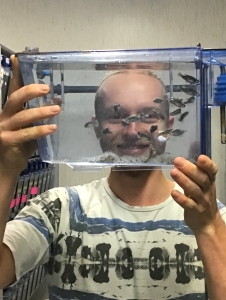 Kaj Kamstra just won a prize for his 3-minute presentation about his PhD work with zebrafish at the Postgraduate Symposium of the School of Biomedical Sciences.
Kaj Kamstra just won a prize for his 3-minute presentation about his PhD work with zebrafish at the Postgraduate Symposium of the School of Biomedical Sciences.
Kaj works with Associate Professor Alex Tups on the mechanisms that regulate body weight and blood glucose levels and uses zebrafish as a model system to investigate these mechanisms in evolutionary more primitive organisms. Kaj generated zebrafish with an inactivated gene for the receptor to the hormone leptin, which regulates the amount of body fat in humans and other mammals. Surprisingly, this did not change the weight of the fish, but instead influenced their blood glucose levels in a similar fashion to what one would expect from the hormone insulin. This suggests that from an evolutionary point of view leptin may have originated as a blood glucose regulator and only later has adopted the function of a “body-fat hormone”.
